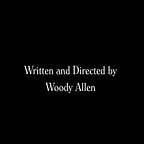Academic Analysis of Themes in Woody Allen’s ‘Manhattan’ (1979)
Woody Allen’s Manhattan (1979) cleverly weaves various themes, capturing the complexity of human relationships and the existential dilemmas of modern life. The following post looks at the major themes in the film, including romantic idealism versus reality, existential anxiety, the search for meaning and the role of art in life (Woody Allen fans will be familiar with them all!).
Romantic Idealism vs. Reality
One of the central themes in Manhattan is the tension between romantic idealism and the often harsh reality of relationships. The film’s protagonist, Isaac Davis (played by Woody Allen), navigates his romantic life with a blend of nostalgia and idealism. He is entangled in relationships that reflect his yearning for a perfect, almost mythic love. This is evident in his affair with Tracy (Mariel Hemingway), a high school student. Isaac’s relationship with Tracy symbolises his idealistic yet problematic quest for purity and innocence. Despite his genuine feelings, the significant age gap and his condescending attitude towards her maturity highlight the impracticality and subjective moral ambiguity of his romantic ideals.
In contrast, Isaac’s friend Yale (Michael Murphy) is involved in an extramarital affair with Mary (Diane Keaton), a woman who embodies intellectual and emotional complexity. Yale’s affair reflects the chaotic and imperfect nature of adult relationships, so often filled with deceit and moral compromises. Mary’s character (so brilliantly played by Diane Keaton), with her neuroses and self-doubt, further underscores the disparity between romantic aspirations and the flawed reality of human connections.
Existential Anxiety
Manhattan is also brimming with existential anxiety, a theme Allen frequently explores in his films. The characters grapple with the meaning of their lives and the inevitability of aging and death. Isaac, for instance, frequently reflects on the significance of his actions and the direction of his life. His decision to quit his job as a television writer to pursue more meaningful writing highlights his quest for authenticity and self-fulfillment, a common existential pursuit.
The film’s setting in New York City, with its busy streets and iconic skyline, serves as a backdrop that amplifies the characters’ existential concerns. The city’s grandeur and perpetual motion contrast with the characters’ internal struggles, emphasising the smallness of individual concerns against the vast, indifferent backdrop of the universe.
The Search for Meaning
Closely related to existential anxiety is the theme of the search for meaning. The characters in Manhattan are often seen trying to make sense of their lives and relationships. Isaac’s various romantic entanglements can be viewed as part of his broader search for a meaningful existence. His conversations with Tracy, Mary, and his ex-wife Jill (Meryl Streep) reveal his deep-seated need to find purpose and connection.
Jill’s decision to write a memoir about her relationship with Isaac, detailing their failed marriage and her subsequent coming out as a lesbian, further complicates Isaac’s quest for meaning. Her success as a writer and her contentment with her new life challenge Isaac to confront his own insecurities and the authenticity of his creative ambitions.
The Role of Art
Art and creativity play a significant role in Manhattan, serving both as a refuge and a source of identity for the characters. Isaac’s aspiration to write a serious book is a means of asserting his individuality and escaping the superficiality he perceives in his television writing job. Similarly, Mary’s intellectualism and Yale’s academic career reflect their need to find meaning and validation through their work.
The film itself, shot in black and white and accompanied by George Gershwin’s music, is a homage to the artistic and cultural richness of New York City. This aesthetic choice underscores Allen’s reverence for art as a means of capturing and transcending the complexities of 20th century life in America.
Manhattan is a rich mix of themes that explore the intricacies of human relationships, the search for meaning and the role of art in life. Through its complex and memorable characters and the stunningly evocative setting of New York City (shot so beautifully by Gordon Willis), the film delves into the tension between romantic idealism and reality, the pervasive nature of existential anxiety and the enduring quest for a purposeful existence. Manhattan remains, not only my personal favourite Woody Allen film but also a poignant reflection on the human condition, still resonating with audiences today through its timeless exploration of these universal themes.
